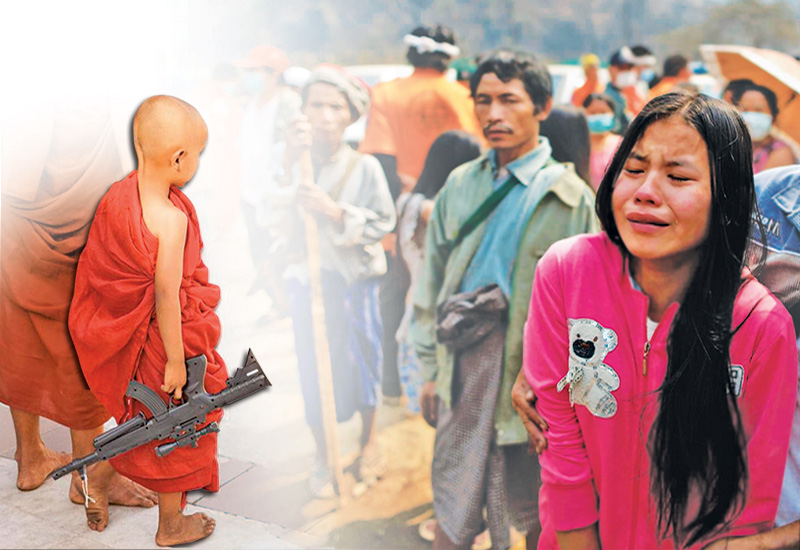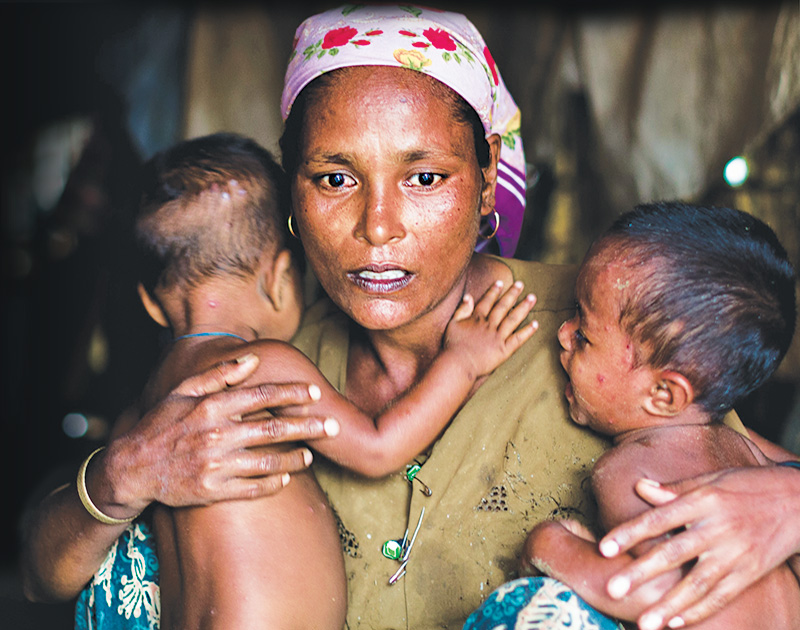Chapter 20 -
Time for Global Community to Step up for Myanmar's Muslims
This article was published in The Jakarta Post on November 22nd, 2015.
The results of Myanmar's general election held on Nov. 8th, 2015 have been officially announced. The opposition National League for Democracy (NLD), led by Nobel Peace Prize Laureate Aung San Suu Kyi, won 348 out of the 664 seats in the parliament, giving the party an outright majority.
This outcome was predicted by almost everyone. What remains unknown is what will now happen in the country.
It is unclear whether or not the military, which has ruled the country with an iron fist following a coup in 1962, will recognize the results. Even if it does, it is unclear what kind of relationship the military will establish with Aung San Suu Kyi, who was held under house arrest for 15 years.
The sad truth is that no matter who is in power, there is very little possibility of any immediate change to the policies governing Myanmar. The Myanmar constitution, which automatically assigns 25 percent of parliamentary seats to the military, does not allow for any change that is not first approved of by the generals.
The new prime minister and government will therefore have to stick to the course sketched out by the military.
The ongoing tragedy afflicting Myanmar's Muslims will head the list of things that the regime will not wish to change. Muslims in Myanmar, who mainly live in the state of Rakhine and who go by the name of Rohingyas, are often deprived of the most basic rights to shelter, health, education, travel, marriage and participation in democratic elections.
Hundreds of thousands of Rohingyas fleeing these inhuman conditions have sought refuge in neighboring countries.
 |
| Many people have lost their lives during the conflicts between the Rohingya Muslims and Buddhists. The ultranationalist Buddhist gangs even indoctrinate their children with an opposition of Muslims. |
What does the report on Myanmar published by Human Rights Watch mean?
The UN human rights council has published five reports about Myanmar and the UN general assembly has adopted 15 separate resolutions.
Thousands of others have lost their lives from attacks or while attempting to flee.
The UN has long monitored events in Myanmar. The UN human rights council has published five reports about
Myanmar and the UN general assembly has adopted 15 separate resolutions.
In the latest of these, dated Feb. 24, 2014, the general assembly reported on arbitrary arrests and detentions, forced displacement, rape, torture, discrimination affecting various ethnic and religious minorities, violence and violations of international humanitarian law.
In the wake of that report, the UN security council considered the question of Myanmar in its session on May 29, 2015.
Two of the permanent members, China and Russia, opposed sanctions against the country, saying that the problem was a domestic matter and represented no threat to world peace and security. Their vetoes meant that no steps were taken by the council.
The pretext for this veto was devoid of any legal foundation. The preamble to the charter of the UN emphasizes "fundamental human rights and the dignity and worth of the human person".
Then, in Chapter I, the charter states the purpose of the UN is "to achieve international co-operation in promoting and encouraging respect for human rights and for fundamental freedoms for all without distinction as to race, sex, language, or religion". The concept of "a threat to international peace", the precondition for the security council imposing sanctions against a country, is not therefore limited to an armed attack on another country.
The UN regards genocide within a country's borders (1994 Rwanda resolution), ethnic cleansing (1991 Iraq resolution), the high loss of property and life (1992 Somalia resolution), widespread human rights violations (1993 Haiti resolution) and racial discrimination (1977 South Africa resolution) as threats to international peace.
All of these elements apply to Myanmar. Consequently, it is illogical, a violation of good conscience and a violation of previous security council resolutions to suggest that Myanmar constitutes no threat to international peace.
 |
| The UN Human Rights Council, ◉ Recognizes the following incidents; |
Will the notion of "humanitarian intervention" be able to stop the massacre in Myanmar?
All jus cogens, the fundamental principles of international law, including the prohibition of genocide and torture, supersede the norms in any international document. The European Parliament (1944) and then the UN (1965 Rhodesia resolution) developed the concept of humanitarian intervention and it is the international community that must enforce this concept.
For example, in the 1990s, the security council designed proposals to stop the slaughter of Muslims during the war in Kosovo. Russia and China vetoed the proposals but NATO went into action anyway under the scope of a humanitarian intervention and put an end to that evil despite the absence of a UN security council decision.
The tragedy in Myanmar can only be ended by the international community.
If ordinary measures fail to produce results, then extraordinary means such as a humanitarian intervention must be employed in the name of humanity to put an end to the genocide in Myanmar.
The legal infrastructure for such an intervention is in place and so is the indignation of the international public.
The only thing that remains to be done is to summon an emergency session at the UN general assembly and adopt a resolution.
Countries can then take the requisite steps in the light of that recommendation.
- Introduction - When the Migration Wave Starts to Wash Ashore
- Chapter 01 - Open Letter to the Burmese (Myanmar) Administration
- Chapter 02 - Events in Myanmar Are Crime Against Humanity
- Chapter 03 - A Cry for Help to the U.N. from Rohingya of Myanmar
- Chapter 04 - Behind the Persecution in Myanmar
- Chapter 05 - Myanmar Should Beware of Radicalism
- Chapter 06 - Deafening Silence over Rohingya Issue
- Chapter 07 - Rohingya People Ignored by Myanmar Government
- Chapter 08 - Why Does the World Turn a Blind Eye on Children's Cries Coming from a Far Corner in Southeast Asia?
- Chapter 09 - Are the Rohingyas Doomed to Remain Stateless?
- Chapter 10 - The Rohingya Muslims Are Being Exiled in Their Own Lands
- Chapter 11 - Differences Can Become Richness
- Chapter 12 - What If You Didn't Have Even an Inch of Land to Live on in This World?
- Chapter 13 - Not the Rohingya Crisis, but a Crisis of Humanity
- Chapter 14 - Are the People of Rakhine Condemned to Be Oppressed in the Countries to Which They Flee?
- Chapter 15 - Being a Muslim Woman in Myanmar
- Chapter 16 - How Does It Feel to Be a Rohingya?
- Chapter 17 - Small Steps That Could Make a Big Difference
- Chapter 18 - The Only Solution to the Refugee Crisis That Shook the World
- Chapter 19 - Rohingyas' Uncertain Fate Post-Polls
- Chapter 20 - Time for Global Community to Step up for Myanmar's Muslims
- Chapter 21 - Humans Have Rights on Paper, but Apparently Not in Real Life
- Chapter 22 - The Forgotten Rohingya
- Conclusion - Unity among Muslims Is the Most Vital Issue
